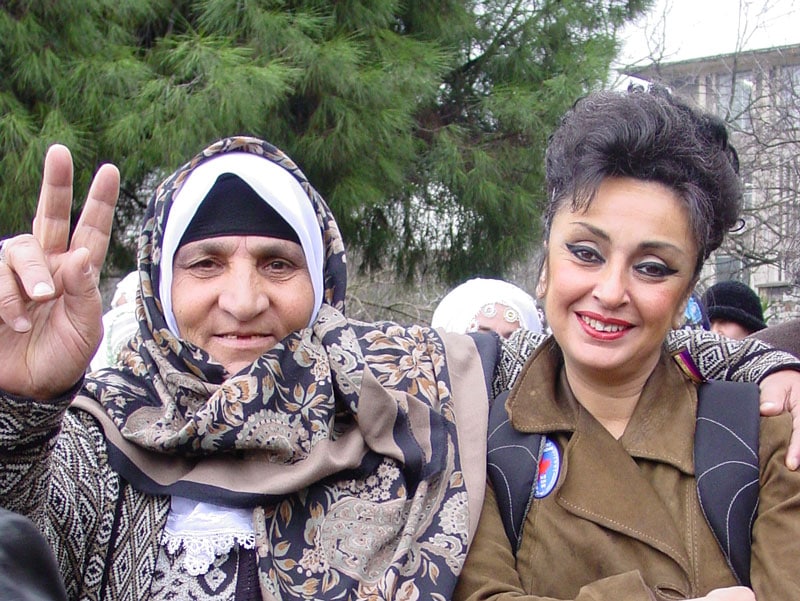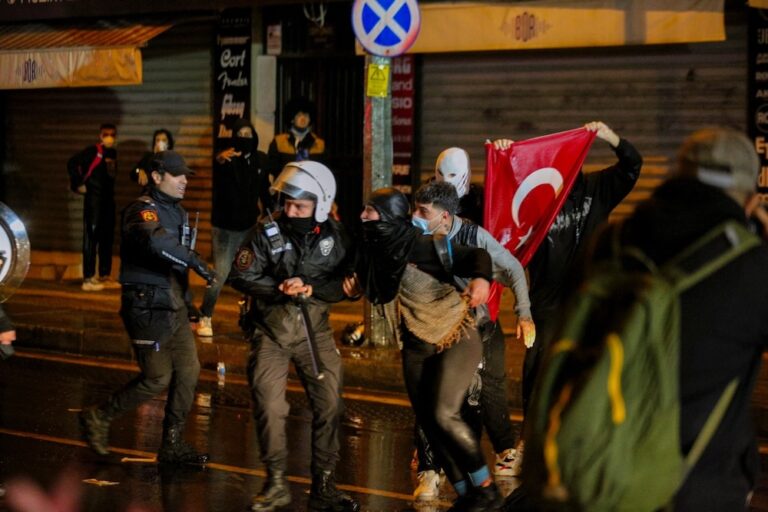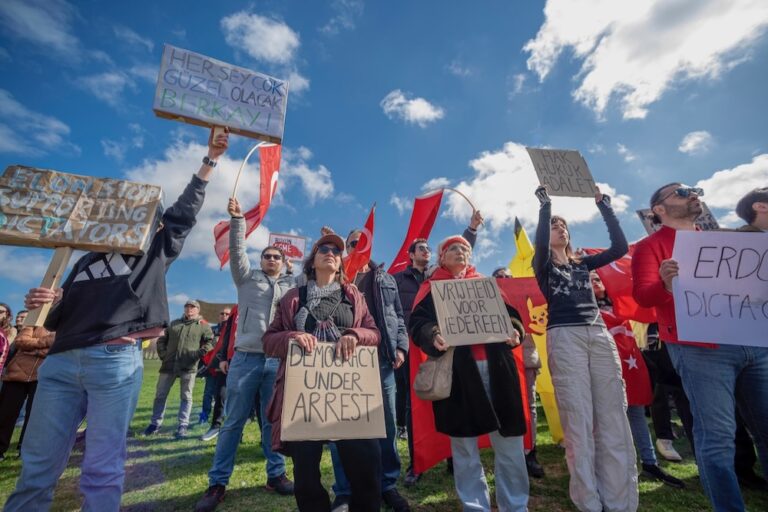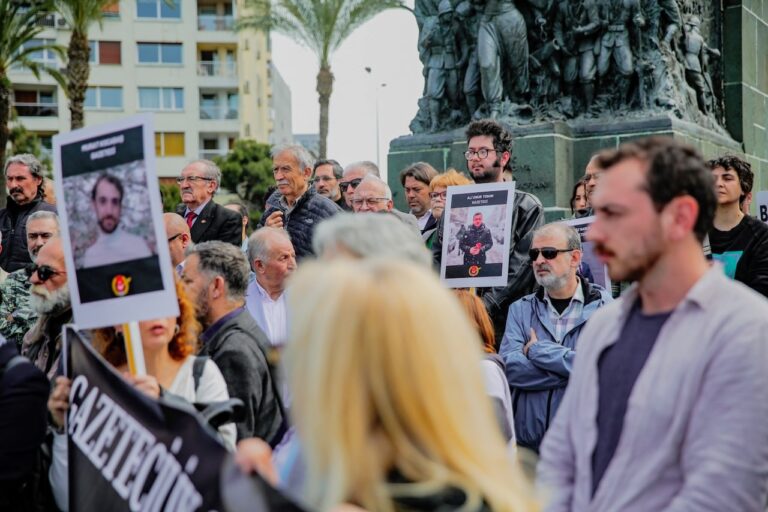Eren Keskin has faced attempts on her life, imprisonment, harassment from public figures and anonymous death threats for her work defending the rights of women subjected to violence in Turkey.
For over 30 years, Eren Keskin has faced attempts on her life, imprisonment, harassment from public figures and anonymous death threats – including calls telling her: We are measuring your coffin” – for her work defending the rights of women subjected to violence in Turkey.
Keskin refuses to be intimidated. She has received multiple honours recognising her work, including the Aachen Peace Award (2004) and Theodor Haecker Prize for Civic Courage and Political Integrity (2005). You can read more about her story on IFEX’s 2013 International Day to End Impunity website.
In this interview, which took place at an event hosted by the Initiative for Freedom of Expression – Turkey (Antenna) at Billgi University, Istanbul, during the 2013 International Day to End Impunity campaign, Keskin speaks with Sara Whyatt about her work, the future, and the problematic issue of impunity in her home country.
- Sara Whyatt: Why is IFEX’s impunity campaign important, and why specifically for Turkey?
Eren Keskin: In Turkey, impunity is a huge issue. There are cases of torture, of unresolved murders and also violence against women. The organisation that I work for provides legal aid for women who have been sexually harassed by civil servants, including police and the military. Since 1997, 387 women have applied to us to help them get justice, but not a single policeman or soldier has been punished. Either no case is brought against the perpetrators or there is such a time lapse between the crime and the cases being brought to court, they are acquitted.
- SW: I was shocked by a recent survey that showed that 28% of 3,500 men interviewed agree that violence can be used to discipline women. Yet the Turkish government signed the Council of Europe Declaration on Violence Against Women in 2011. Have there been any recent changes in government policy?
EK: One major development is that the issue has more visibility and is more widely debated. There have also been improvements in the law. For example, the definition of rape has been made clearer and has been extended, as has the definition of sexual harassment. Also positive is that a woman who reports rape no longer has to undergo a virginity test against her will. Now this can only happen in limited cases and is subject to strict rules.
However, on a practical level, it is still difficult to report on and document sexual violence. For example, the courts do not accept as evidence reports from independent doctors, only evidence provided by forensic medics employed by the state.
- SW: How is sexual violence reported in the press? Is it possible to report openly about it?
EK: Up until one or two years ago violence against women was only lightly touched on in the media. However, now that male violence and the murder of women is more openly debated, it is also more widely covered and sensitively treated in the press. Yet it remains insufficiently covered, and that is disturbing.
- SW: Are you finding lately that your relations with the authorities are becoming more sympathetic and constructive?
EK: The authorities are paying lip service to a certain degree. Since the founding of the Republic this country has been dominated by a feudal, male, and military mind-set. This current government has a very gender-oriented mentality. This is a woman’s cause, a cause pursued by women. So even if this government says it wants to make change, I don’t really have any hope that there will be change.
- SW: Back in the 90s you faced numerous threats and at least one attack on your life, a shocking attack. Do you personally, or the people that work with you, still get threatened?
EK: Although it is not comparable to what I faced in the past, I still get threats. For instance, I get threatening letters from people who are in prison. A police chief opened a Facebook page with threats against me. But it’s not useful to compare the levels of threat in the past with those of today. Although they are less, they are still a problem.
- SW: I notice that there are currently charges against you. Can you tell me more about this?
EK: There are several cases against me, including under Penal Code articles 301 [insult to the state] and 216 [provoking public hatred]. For example, if you write of the rape of a woman or a child it is regarded as an insult to the state because when you accuse a policeman, who is an operative of the state, then by implication you are insulting the state as a whole.
- SW: How many charges have been made against you and over how long a period?
EK: More than ten, over a period of years. Some are in the higher [appeal] courts. In some I was acquitted but the acquittals were overturned and are back in court.
- SW: The Turkish legal system is extraordinarily long-winded and complex, and widely criticised as unfair. There have been a number of legal reforms in recent years designed to tackle this problem. How far have they gone towards improving the situation?
EK: There has been partial improvement. For example, you no longer have people who disappear in detention. The number of unresolved murders has decreased. But torture still goes on, police brutality during demonstrations still goes on and there remain unsolved killings. So there is still violence today but it is not as intense as it was in the 1990s.
- SW: How do you see the future?
EK: I don’t think there will be significant improvements in the short run because the current government, as was the case with previous governments, will not cross the red line on sensitive issues like the Armenian genocide, human rights abuses by the army, and violence against women. They do have their own ideas for solutions to these issues, but I don’t think there will be significant improvements, so of course the fight goes on.
- SW: How important has IFEX’s impunity campaign been for you and others in Turkey?
EK: Solidarity has protected us against attack. This support has been immensely important.
“Since 1997, 387 women have applied to us to help them get justice, but not a single policeman or soldier has been punished.”Eren Keskin



